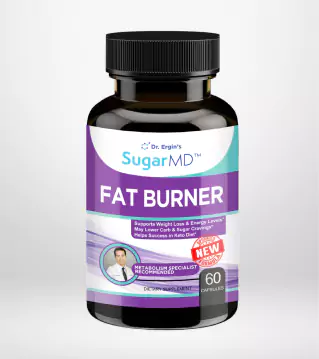
UP TO 40% OFF SITEWIDE






Discover the Best Meal Replacement Shakes for Weight Loss & Diabetes


Table of Contents
- Understanding the Connection Between Weight Loss & Diabetes
- The Importance of Glycemic Index in Diabetes Meals
- Diabetes Management Plan for Weight Loss
- Why Meal Replacement Shakes?
- Convenience and Portability
- Nutrient-Dense Options for People with Diabetes
- Control Blood Sugar with Balanced Meals
- The Role of Protein Shakes in Weight Management
- What to Look for in a Meal Replacement Shake
- Low Glycemic Index and Blood Glucose Control
- Protein Content and Diabetic Friendly Options
- Avoiding Added Sugar and Blood Sugar Spikes
- Health Conditions to Consider
- Top Picks for Meal Replacement Shakes Recipes
- High in Protein, Low in Sugar
- Best for Diabetes Care
- Best for Weight Management
- Best for Overall Health
- The Role of Supplements: Introducing SugarMD Weight Loss Formula
- Key Ingredients and Their Benefits
- Common Mistakes to Avoid
- Overlooking Nutritional Labels
- Ignoring Individual Health Conditions
- Failing to Consult a Healthcare Provider
- Neglecting Regular Exercise
- Frequently Asked Questions
- Are Meal Replacement Shakes Safe for Diabetes?
- How Often Should I Consume These Shakes?
- Can I Use These Shakes for All Meals?
- What Are the Long-Term Effects?
- Conclusion
- About The Author
Are you on the hunt for the best meal replacement shakes for weight loss & diabetes? You're not alone. Managing weight and blood sugar levels can be a challenging task, especially for those dealing with diabetes. But don't worry, we've got you covered!
In this comprehensive guide, we'll explore everything you need to know about choosing the right shakes that not only help you shed those extra pounds but also keep your diabetes in check. So, let's dive in!
Understanding the Connection Between Weight Loss & Diabetes
Let's start with the basics. Blood sugar levels are a big deal when you're trying to lose weight. Why? Because high blood sugar levels can lead to insulin resistance. Insulin is the hormone that helps your cells absorb glucose. When your cells don't respond well to insulin, guess what happens? Your body needs more insulin to keep blood sugar levels stable.
And here's the kicker: Insulin also promotes fat storage. So, more insulin means it's harder to lose weight. It's a vicious cycle, really. You have high blood sugar, you produce more insulin and you gain weight. Simple as that. Now, let's talk about type 2 diabetes. This condition is often linked to obesity. But it's not just about the extra pounds. It's about where the weight is located.
Belly fat, for instance, is a major culprit. It releases fatty acids into your bloodstream which can lead to insulin resistance. So, if you're dealing with type 2 diabetes, weight management becomes even more crucial. It's not just about looking good; it's about keeping those blood sugar levels in check to avoid complications like heart disease and kidney failure.
The Importance of Glycemic Index in Diabetes Meals
Ever heard of the glycemic index? If you're managing diabetes and trying to lose weight, this term should be on your radar. The glycemic index measures how quickly a food raises your blood sugar levels. Foods with a high glycemic index can cause rapid spikes in blood sugar which is a no-go for diabetes care.
On the flip side, foods with a low glycemic index are digested more slowly, helping to control blood sugar and keep you full longer. So, when choosing diabetes meals, always consider the glycemic index. It can be a game-changer in your weight loss journey.
Diabetes Management Plan for Weight Loss
Alright, so you understand the connection between weight loss and diabetes. What's next? A diabetes management plan tailored for weight loss, of course! This involves a balanced diet, regular exercise and possibly some medications or supplements.
Speaking of supplements, have you considered SugarMD Weight Loss Formula? It's designed to help control your appetite and boost metabolism, making it a great addition to your diabetes management plan. But remember, always consult your healthcare provider before starting any new supplement or medication.
Why Meal Replacement Shakes?
Convenience and Portability
Let's face it, we're all busy. Between work, family and trying to squeeze in some exercise, who has the time to prepare a balanced meal three times a day? Enter meal replacement shakes. These shakes are not just convenient; they're also portable.
Imagine you're running late for a meeting. Instead of grabbing a high-calorie, sugar-loaded snack that'll spike your blood sugar levels, you could opt for a meal replacement shake. Just toss it in your bag and you're good to go. It's that simple.
Nutrient-Dense Options for People with Diabetes
But convenience isn't the only selling point. For people with diabetes, nutrient-dense options are a must. You need a shake that's packed with vitamins, minerals and other essential nutrients. Why? Because nutrient-dense foods help in diabetes care by stabilizing blood sugar levels.
They're low in added sugar and high in fiber and protein which are crucial for controlling blood sugar and aiding in weight management. So, when you're choosing a meal replacement shake, make sure it's nutrient-dense. Your body will thank you.
Control Blood Sugar with Balanced Meals
Now, let's talk about blood sugar control. A balanced meal is key to maintaining stable blood sugar levels. But what constitutes a balanced meal? Ideally, it should have a good mix of protein, healthy fats and low-glycemic carbs. Many meal replacement shakes are formulated to offer this balance.
They can help you avoid blood sugar spikes and keep you full longer which is essential for weight management. So, if you're looking to control your blood sugar while losing weight, a well-formulated meal replacement shake could be your new best friend.
The Role of Protein Shakes in Weight Management
You might be wondering, "What's the deal with protein shakes?" Well, protein shakes are a type of meal replacement shake that focus on—you guessed it—protein. Protein is a key player in weight management. It helps build muscle and muscle burns more calories at rest compared to fat.
Plus, protein keeps you full which means you're less likely to reach for unhealthy snacks. So, if you're particularly interested in weight management, a protein shake might be the way to go.
What to Look for in a Meal Replacement Shake
Low Glycemic Index and Blood Glucose Control
First things first, let's talk about the glycemic index (GI). If you're on the hunt for the best meal replacement shakes for weight loss & diabetes the GI should be a top consideration. Why? A low-GI shake will have a slower impact on your blood glucose levels.
That means no sudden spikes and crashes which is crucial for diabetes management. So, when you're scanning the nutritional label, look for shakes that specifically mention a low glycemic index. It's a small detail that can make a big difference in controlling your blood sugar.
Protein Content and Diabetic Friendly Options
Next up, protein. Protein is more than just a buzzword; it's an essential nutrient, especially for people with diabetes. A high-protein shake can help you feel fuller for longer, reducing the temptation to snack on unhealthy options. But here's the catch: not all proteins are created equal.
Opt for shakes that contain high-quality protein sources like whey or plant-based proteins. These are not only diabetic friendly but also aid in weight management. So, make sure to check the protein content and its source when choosing your shake.
Avoiding Added Sugar and Blood Sugar Spikes
Sugar the nemesis of stable blood sugar levels. You'd be surprised how many meal replacement shakes are loaded with added sugar. And we all know what that means: blood sugar spikes.
When you're managing diabetes and trying to lose weight the last thing you need is a shake that's going to throw your blood sugar levels out of whack. So, read those labels carefully. Look for shakes that use natural sweeteners or have no added sugar at all. Your blood sugar levels will thank you.
Health Conditions to Consider
Finally, let's not forget about other health conditions you may have. Are you lactose intolerant? Do you have high cholesterol? These conditions can influence your choice of a meal replacement shake. For instance, if you're lactose intolerant, a plant-based shake would be a better option.
If you have high cholesterol, steer clear of shakes that are high in saturated fats. Your overall health conditions should be part of your decision-making process. After all the goal is to find a shake that complements your diabetes management plan and supports your weight loss goals.
Top Picks for Meal Replacement Shakes Recipes
High in Protein, Low in Sugar
Let's kick things off with a recipe that's a powerhouse of protein but low on sugar. Why is this important? Well, a high-protein shake can keep you full for longer periods, reducing the urge to snack. Low sugar means you're not going to experience those dreaded blood sugar spikes.
So, what's in this shake? Think whey protein, almond milk and a dash of Stevia for sweetness. Add some chia seeds for fiber and you've got yourself a shake that's not just delicious but also diabetic friendly and excellent for weight management.
Best for Diabetes Care
Next on the list is a shake specifically designed for diabetes care. This one's all about blood glucose control. It features ingredients like cinnamon and fenugreek, both known for their ability to stabilize blood sugar levels. The base could be a blend of low-glycemic fruits like berries and a handful of spinach for added nutrients.
Use coconut milk for creaminess without the added sugar. This shake is a nutrient-dense option that aligns well with a diabetes management plan. It's like having your cake and eating it too, but in a way that's good for you.
Best for Weight Management
If weight management is your primary concern, this shake's for you. It's formulated to be low in calories but high in nutrients. Ingredients? Avocado for healthy fats, pea protein for a plant-based protein punch and a sprinkle of flaxseeds for fiber.
Add water or unsweetened almond milk as the liquid base. The result is a shake that's filling but won't tip the scales in the wrong direction. It's a win-win for those looking to shed some pounds while keeping their blood sugar levels in check.
Best for Overall Health
Last but not least, let's talk about a shake that's the best pick for overall health. This one combines elements from all the previous shakes. It's got protein, it's low in sugar and it's packed with nutrients.
Ingredients like kale, spirulina and a small amount of banana for natural sweetness make this shake a well-rounded option. Throw in some hemp seeds for added protein and omega-3 fatty acids and you've got a shake that's not just good for weight loss and diabetes but also for your overall well-being.
The Role of Supplements: Introducing SugarMD Weight Loss Formula
When it comes to weight loss and diabetes management, meal replacement shakes are a fantastic option. But sometimes, you might need an extra push. That's where supplements like SugarMD Weight Loss Formula come into play. This isn't just any supplement; it's specifically designed to aid in fat reduction while being mindful of blood sugar levels.
So, how does it work? SugarMD Fat Burner targets multiple aspects of weight loss and diabetes care. It helps control your appetite, boosts your metabolism and even blocks fat formation. It's like a multi-tool in your weight loss toolbox.

Key Ingredients and Their Benefits
Now, let's delve into what makes SugarMD Fat Burner tick. The formula is a blend of carefully curated natural ingredients, each serving a specific purpose.
- White Mulberry: This ingredient limits carbohydrate absorption. That means fewer carbs are converted into sugar, helping to control blood sugar levels.
- L-phenylalanine: This amino acid triggers satiety hormones. What does that mean for you? You'll feel full faster and for longer periods, reducing the need for extra snacking that can lead to weight gain and blood sugar spikes.
- DHEA: This component blocks an enzyme known as G6PD which is responsible for fat formation. By blocking this enzyme, DHEA aids in reducing fat accumulation.
- Green Tea Extract: A well-known metabolism booster, green tea extract also raises satiety hormones. That means you'll not only burn calories faster but also feel full longer.
- Banaba: This ingredient reduces appetite and stops fat accumulation. It's like a one-two punch for weight loss and diabetes management.
Each ingredient complements the other, creating a synergistic effect that makes SugarMD Fat Burner a compelling addition to your diabetes management plan and weight loss journey. It's not a magic pill, but when combined with a balanced diet and regular exercise, it can make a significant difference.
Common Mistakes to Avoid
Overlooking Nutritional Labels
Let's start with a mistake that's easy to make but can have significant consequences: overlooking nutritional labels. You might think you're picking up the best meal replacement shakes for weight loss & diabetes, but have you checked the label?
It's not just about calories; it's about what makes up those calories. Is the shake high in added sugar? Does it contain enough protein? What about fiber? Ignoring these details can lead to blood sugar spikes and hinder your weight management efforts. So, always read the label. It's your first line of defense in making an informed choice.
Ignoring Individual Health Conditions
Next, let's talk about individual health conditions. Diabetes is not a one-size-fits-all condition. You might have other health issues like high cholesterol or lactose intolerance. These conditions can significantly impact your choice of a meal replacement shake.
For instance, if you're lactose intolerant, a whey-based shake might not be the best option for you. Or, if you have high cholesterol, a shake rich in saturated fats is a no-go. Always consider your overall health profile when making your choice.
Failing to Consult a Healthcare Provider
This one's a biggie. You might think you've got it all figured out, but failing to consult a healthcare provider can be a costly mistake. A healthcare provider can offer personalized advice tailored to your specific needs and conditions.
They can help you integrate meal replacement shakes and even supplements like SugarMD Weight Loss Formula into your diabetes management plan. So, don't skip this step. It's always better to have professional guidance.
Neglecting Regular Exercise
Last but definitely not least, exercise. You might think that a meal replacement shake is a silver bullet for weight loss and diabetes care. But let's get real; it's not. A balanced diet is crucial, but so is regular exercise. Exercise helps in controlling blood sugar levels and is an essential component of any weight management strategy.
Whether it's a brisk walk, a jog, or a full-blown gym session, make sure to include some form of physical activity in your routine.
Frequently Asked Questions
Are Meal Replacement Shakes Safe for Diabetes?
The question of safety is paramount, especially when you're dealing with a condition like diabetes. So, are meal replacement shakes safe for diabetes? The short answer is yes, but with a caveat. Not all shakes are created equal. Some are high in added sugar which can lead to blood sugar spikes.
Others might lack essential nutrients. Therefore, it's crucial to choose shakes that are low in sugar, high in protein and rich in fiber. These elements contribute to better blood glucose control and make the shake a safer option for people with diabetes.
How Often Should I Consume These Shakes?
Another common question is about frequency. How often should you consume these shakes? Well, it depends on your individual health conditions and weight management goals. Generally speaking, replacing one meal per day with a shake is a good starting point.
However, it's essential to consult a healthcare provider for personalized advice. They can help you determine the right frequency based on your diabetes management plan and other health considerations.
Can I Use These Shakes for All Meals?
Now, you might be wondering, "Can I replace all my meals with these shakes?" While meal replacement shakes offer a convenient and often nutrient-dense option they shouldn't replace all meals. Why? Because whole foods offer a range of nutrients and benefits that shakes can't fully replicate.
For instance, whole foods provide more fiber which is essential for controlling blood sugar and aiding in weight management. So, while these shakes can be a part of your diet they shouldn't be the whole story.
What Are the Long-Term Effects?
Lastly, let's tackle the question of long-term effects. Meal replacement shakes can be a useful tool for weight loss and diabetes care in the short term. But what about the long haul? The long-term effects largely depend on the quality of the shakes you choose and how you integrate them into a balanced diet and lifestyle.
If you're consuming high-quality, nutrient-dense shakes and combining them with regular exercise and a balanced diet the long-term effects can be positive. However, relying solely on shakes without considering other aspects of a healthy lifestyle can lead to nutrient deficiencies and other health issues.
Conclusion
Choosing the best meal replacement shakes for weight loss & diabetes doesn't have to be a daunting task. With the right information and a little bit of guidance, you can find a shake that fits your nutritional needs and lifestyle.
Remember the key to effective weight management and diabetes care lies in a balanced diet, regular exercise and the right supplements. So go ahead, take control of your health today!
About The Author
Meet Dr. Ahmet Ergin a highly skilled and dedicated endocrinologist with a passion for diabetes care. Dr. Ergin earned his medical degree with honors from Marmara University in Istanbul. He completed internal medicine residency and endocrinology fellowship at Cleveland Clinic.
Dr. Ergin is board-certified in Internal Medicine, Endocrinology, Diabetes, and Metabolism due to his vast medical expertise. He's a certified diabetes educator, author of "The Ultimate Diabetes Book," and founder of "the SugarMD YouTube channel."
Dr. Ergin offers exceptional diabetes care to his patients in Port Saint Lucie, FL, helping them manage effectively. Disclaimer: These statements have not been evaluated by the Food and Drug Administration. Information on this website isn’t intended to treat, cure or prevent any disease. Discuss with your doctor and do not self-treat.
Written By Dr. Ahmet Ergin
466 total articles
Meet Dr. Ahmet Ergin, a highly skilled and dedicated endocrinologist with a passion for diabetes care. Dr. Ergin earned his medical degree with honors from Marmara University in Istanbul. He completed internal medicine residency and endocrinology fellowship at Cleveland Clinic. Dr. Ergin is board-certified in Internal Medicine, Endocrinology, Diabetes, and Metabolism due to his vast medical expertise. He's a certified diabetes educator, author of “The Ultimate Diabetes Book,” and founder of “the SugarMD YouTube channel.” Dr. Ergin offers exceptional diabetes care to his patients in Port Saint Lucie, FL, helping them manage effectively. For a closer look into his insights and experiences, connect with Dr. Ahmet Ergin on LinkedIn, Instagram, and YouTube.”
Disclaimer: These statements have not been evaluated by the Food and Drug Administration. Information on this website isn't intended to treat, cure or prevent any disease. Discuss with your doctor and do not self-treat.
Products









